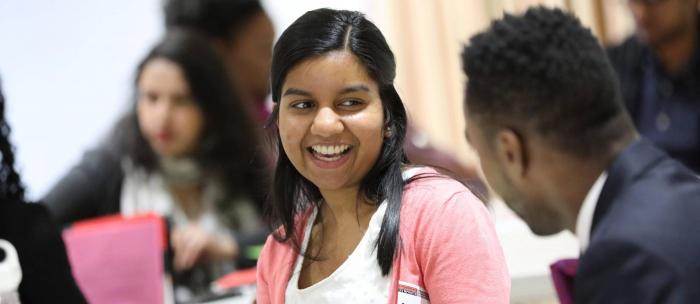
Advising Syllabus
This Academic Advising Syllabus is designed to assist students with their transition to College, introduce them to many key support resources available within the College of Engineering, and help them navigate their academics at Cornell. It also outlines the expectations and responsibilities that students have as an advisee, and strategies for creating a successful partnership with their Advisors.
For Academic Year 2024-2025
Please spend some time reviewing the Academic Advising Syllabus sections.
Advising Model
Click to OpenThe College of Engineering is committed to providing students with informed and purposeful guidance throughout their undergraduate education and identifies academic advising as a critical source of academic and personal support. The structure of advising within the College centers around the student as the advisee, and assumes a multifaceted approach focusing on three main advising resources:
- Professional Academic Advisors: With a focus on first- and second-year unaffiliated students, the Professional Academic Advisors in the Engineering Advising office provide a variety of advising services to help with academic and personal matters. Paying particular attention to issues related to the engineering common curriculum and the major affiliation process, Engineering Advising also offers specialty advising for course enrollment, liberal studies requirements, study abroad and international education experiences, pre-health careers, the internal transfer process, transfer credit, petitions, and more.
- Faculty Advisors: Faculty Advisors help students translate their interests into an appropriate course of study, evaluate their curriculum and workload, monitor their progress toward a degree, and take advantage of the diverse opportunities available at Cornell. They provide guidance on College and major curriculum requirements, advise students on course substitutions, and offer support for students’ academic and personal development and goals. Students should consult their faculty advisor when they have questions about the academic requirements of the University, the College, or the schools and departments.
- Peer Advisors: Peer Advisors are senior, junior, and sophomore engineering students who assist new students with the transition from high school to college. As part of their participation in the Engineering Seminar (ENGRG 1050), all first-year students will interact with their Peer Advisors.
Vision, Mission, and Goals
Click to OpenVision
The Engineering Advising office at Cornell University envisions a healthy, engaged, and inclusive community of learners by pioneering knowledge and discovery in advising, creating superior initiatives, and advancing solutions that meet the needs of our students while supporting their health and wellbeing.
Mission
To promote a collaborative advising process of expansive inquiry, critical thought, and personal responsibility, which empowers students to make well-informed decisions regarding their academic and career goals.
Goals
Our office strives to:
- Ensure that students have the information, counsel, and resources to succeed;
- Offer multiple modes of access for students to connect with professional academic advisors;
- Provide accurate and current information to current Engineering undergraduate students, prospective Engineering undergraduate students, and other interested students regarding major, College, and University degree requirements, policies, procedures, rules, and regulations;
- Work in partnership with Engineering faculty advisors, peer advisors, administration and staff, as well as faculty from other Cornell colleges and schools and various other University entities, in order to promote student success within the College;
- Work with students in an environment emphasizing the developmental process of student growth and success;
- Keep abreast of relevant academic advising, student development, and related research and literature to constantly improve our services to students;
- Promote the shared responsibility of academic advising between the student and the advisor;
- Evaluate and assess our programs and services.
Advisor Responsibilities
Click to OpenThe responsibilities of the Professional Academic Advisors within the Engineering Advising office include:
- Advising first- and second-year unaffiliated students, with continued access for upper-class students;
- Helping students navigate the Engineering Common Curriculum and successfully affiliate with a major;
- Providing specialty advising for:
- course enrollment;
- Liberal Studies;
- study abroad/international experiences
- pre-health careers and how to integrate requirements into the curriculum;
- transferring internally (between colleges) within Cornell;
- Health and well-being - if you need immediate guidance or advice about a physical or mental health concern, you can contact Cornell Health 24/7.
- student disability services;
- major exploration including the Independent Major and the affiliation process;
- minors and double majors;
- transfer credit, petitions, and curricular substitutions;
- the criteria for good academic standing;
- voluntary, required, and health leaves of absence and withdrawals.
- Coordination of the Academic Concern program;
- Supporting students having academic or personal difficulties and referring students to appropriate campus resources;
- Providing case management for students who are in need of academic consideration and/or in distress;
- Partner with faculty advisors and major departments to best support students;
- Protect the privacy of student education records as per FERPA.
Advisee Responsibilities
Click to OpenA successful advising relationship is dependent upon students, as well as faculty and staff, taking an active role in the advising process. Some expectations within this process for students include:
Academic Milestones
Click to OpenThis page is currently under construction. Check back soon for more information!
Meet the Advisors
Click to OpenMore information about the Professional Academic Advisors can be found at Meet the Staff.

